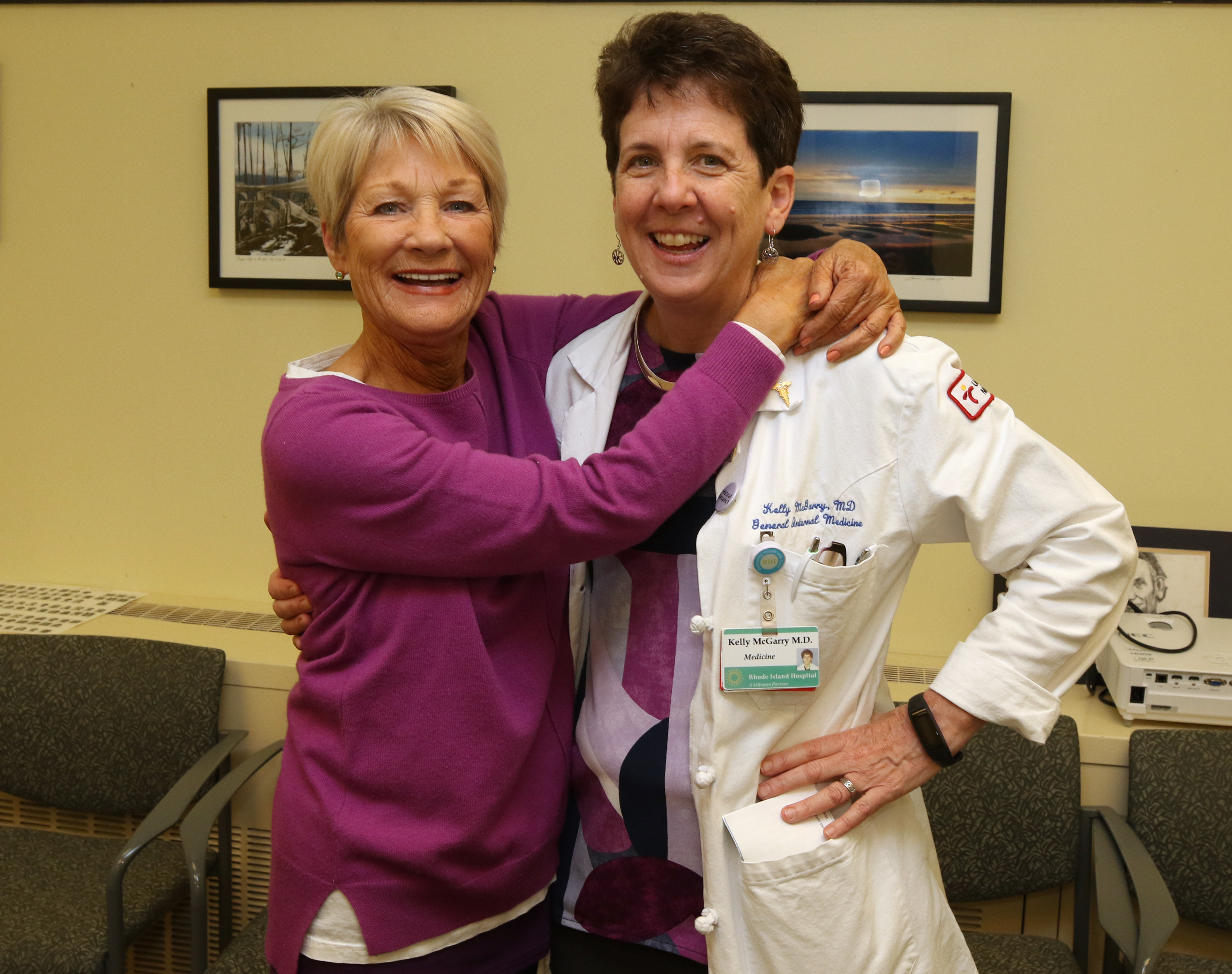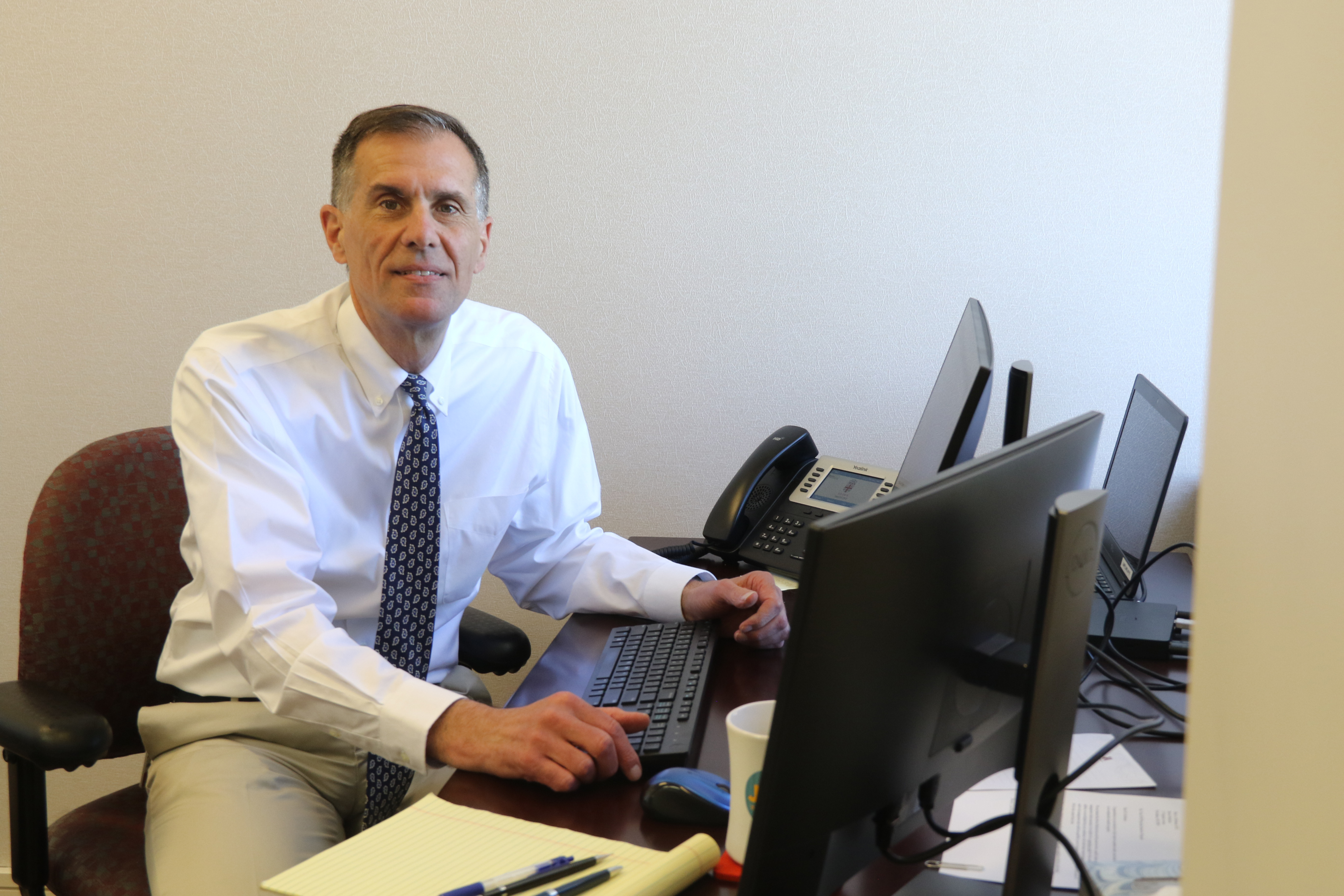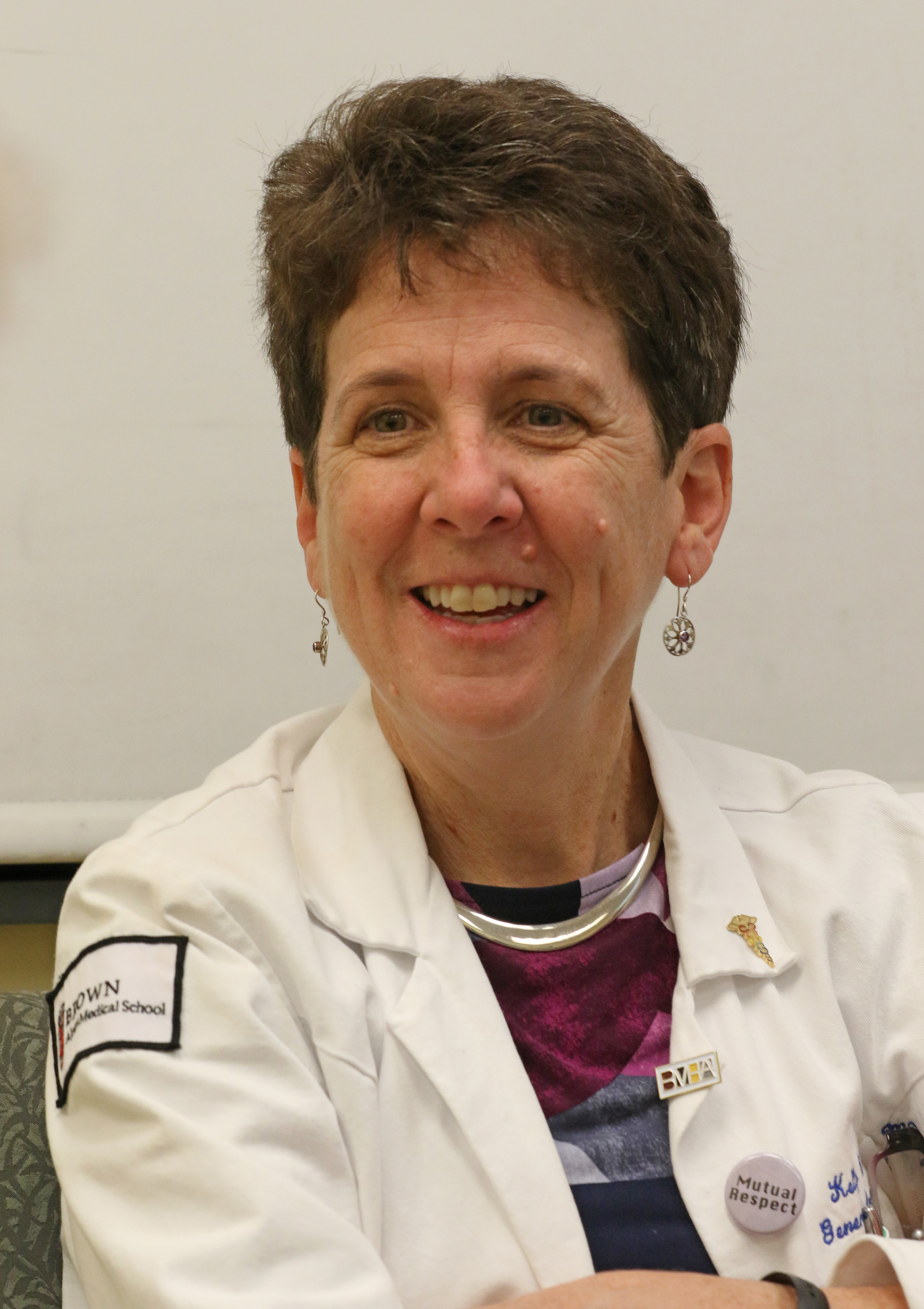If your doctor was a friend, how good would you feel?
Joan Anderson speaks with affection about Kelly McGarry.
“Everyone loves this woman,” she says.
“The feeling is totally mutual,” McGarry replies.
The women consider each other friends. But more critically, as regards Anderson’s well-being, is the fact that McGarry – Dr. Kelly A. McGarry, of Rhode Island Hospital and Brown University – is the 73-year-old woman’s long-time primary-care physician.
That responsibility, many experts agree, is of fundamental importance to a person’s health, starting at birth and continuing through the elder years. No other practitioner in the health-care spectrum is vested with the same powers of prevention, maintenance, education – and, when necessary, referral to a specialist. All, typically, in cost-conscious fashion, experts agree.
“We want to provide the best care to individual patients and do it in a financially responsible way -- and I mean that both to the system as well as to the patient, to consider what we're giving the patients what they can afford and what makes sense,” says McGarry.
Anderson, the retired owner and president of Impact Corporate Consultants & Trainers, found McGarry about two decades ago and has remained her patient since. The doctor has seen her through a few health issues and been a central factor in her overall good health, says Anderson, an East Providence resident.
“She keeps me well,” she says.
She does the same for several relatives, including Anderson’s 98-year-old mother, Nancy Stevens, who also have been McGarry’s patients for years. Stevens would not be here today, her daughter says, if not for the primary-care physician.
“My mom almost died in November,” Anderson says. “She was sick for quite a while, a couple of months, and she kept saying it was a bad cold and it was going to go away.”
It didn’t. It wasn’t a cold. Stevens had pneumonia, a particular risk to the elderly.
“We got Kelly on the phone,” Anderson recalls. “She said ‘You talk to her and give her a choice. You can sit in that chair and die in half an hour, or you can get in a rescue and go to the hospital.’ She doesn’t like doing that, but she made that choice.”
“I got her directly admitted,” McGarry says.
After several days of treatment, Stevens was cured and discharged to her home.
Would she have listened to some doctor stranger?
Perhaps not.
“The true value of the primary-care provider is that longevity, the continuity with the patients, knowing them and their family members,” McGarry says. “How we get somebody to engage in lifestyle modification and disease reduction over time is incredibly valuable to the health of the community.”

Geriatrician Dr. Peter A. Hollmann, president of the Rhode Island Medical Society, agrees that such a “longitudinal” health-care relationship is invaluable. Being able to quickly reach a familiar doctor at a time of urgent need can also save money, Hollmann says – especially contrasted with a costly visit to a hospital emergency room.
“You have an ability to get care when you need it, and it may be just a phone call,” Hollmann told The Journal. “You can find a very cost-effective method and you don't waste money or time on more expensive alternatives.”
Keeping comprehensive records of a patient’s health history, as primary-care practices strive to do to, also helps, says Hollmann, a practicing geriatrician and chief medical officer, administration, for Brown Physicians Inc. So does organizing a practice to include nurses, assistants and others supporting the physician, Hollman says.
“You still should have one person that you identify with,” he says, “but that's the way we need to approach primary care: Not as a primary-care physician but a primary-care practice and team of people.”
Which, he says, should provide custom-tailored, comprehensive care.
“For a given person, comprehensive may mean just prevention,” he says. “For another, it may mean [managing] heart failure and diabetes and eye problems and urinary problems. The geriatrics people I take care of tend to have lots of accumulated conditions. So comprehensive is pretty broad. Does that mean I'm an expert in every one of those conditions? Of course not, but I try to take the whole picture into account.”
Which is an advantage in deciding whether and when to refer a patient to a specialist, Hollmann says.

As beneficial as it would be to individuals and the public health, not every Rhode Islander has access to primary care. Some residents may not appreciate its value, which suggests that educational efforts need to be intensified. Racial and economic barriers persist. And some experts say the state is experiencing a shortage of primary-care physicians.
According to the state Department of Health’s 2015 Statewide Health Inventory -- the most recent accounting of outpatient care, hospitals, long-term care centers and other health-care providers -- Rhode Island has 602.7 full-time equivalent primary-care physicians for its total population of just over one million residents. A total of 830 primary-care doctors were identified, meaning some clinicians worked part-time.
A 2012 study by the federal Centers for Disease Control and Prevention found that states vary widely in the number of primary-care physicians per 100,000 population, with Mississippi ranking lowest -- 26.5 per 100,000 residents -- and Hawaii, with 93.7, placing highest. Rhode Island with a figure of 66.6 ranked “significantly above national average,” as did Massachusetts, with 65.7, and Vermont, with 66.8.
The Rhode Island inventory found that the location of practices varied widely, with some communities having none – Glocester, West Greenwich and Exeter, for example – and others, such as Providence, home to 39 -- having large concentrations. Primary-care physicians were predominantly white, accounting for more than 72% of the workforce, compared with 8.1% black.
Although the inventory did not address the racial, ethnic and economic status of primary-care provider’s patients, other studies have assessed overall health outcomes and found significant disparities by race, income, education and zip code.
“The conditions and environments in which we live, work and play have an enormous impact on our health, often dictating the availability and quality of resources that help people live healthy lives,” the Health Department’s 2015 Minority Health Facts study concluded. The Journal examined this issue in a story last year and reported on the above disparities.
As director of the primary-care residency program for Brown’s Alpert Medical School, McGarry has deep knowledge of Rhode Island’s primary-care needs. Despite Rhode Island’s national ranking, she is among those who maintain that Rhode Island, like other parts of the country, does not have enough providers.
Recent research by the Association of American Medical Colleges, among other organizations, describes a growing national shortage, with the AAMC estimating a shortfall in the U.S. of between 14,800 and 49,300 primary-care physicians by the year 2030.
Part of the reason, McGarry says, is what primary-care doctors earn: an average of $195,000 annually, according to the American Academy of Family Physicians, compared to an average of $284,000 for other specialties. In some of those, salaries are significantly higher: orthopedic surgeons and neurosurgeons can earn $500,000 or more a year, for example.
Such numbers, McGarry says, prove attractive for young doctors who will enter the workforce with hundreds of thousands of dollars of education debt.
“The pressure is to think about going into a discipline that would enable them to have the ability to pay that off sooner and not feel like they were in debt for the first ten years in their career,” McGarry says. “That’s a realistic concern. I mean, who wants to have hundreds of thousands of dollars’ worth of debt starting off in your career and maybe starting your family and whatever? That's a lot of money.”
The state Department of Health, using a federal grant, is attempting to help through its Rhode Island Health Professional Loan Repayment Program.
“Through this program, we make health education loan repayments to primary care health professionals that have made a commitment to practice in medically underserved communities in Rhode Island,” department spokesman Joseph Wendelken told The Journal. “The program involves a service obligation of between two and four years and up to six years of continuation service is available.”

Many of primary-care physician Elizabeth B. Lange’s patients first met her shortly after they were born. A pediatrician, Lange practices with Waterman Pediatrics, a Coastal Medical group, and is a fellow of the American Academy of Pediatrics. Like Hollmann and McGarry, she is affiliated with Brown University.
And like her colleagues, Lange is motivated by love of her profession – an affection with roots in her Connecticut childhood.
“I’ve wanted to be a pediatrician since I was really little,” says Lange, who has been a pediatrician since the 1990s. “I’m the first medical person in my family but I’ve always loved children. And what I see in children literally is the potential for our future. So when children are raised healthy and happy and loved and safe, they are our next generation. cq - no words missing
“So I focus my energy on each day making sure that your child has the best start that they can to their life. I partner with families that are helping to raise these children -- and partner with community agencies that are helping to raise these families, these children.”
The ongoing contact with patients that McGarry and Hollman describe is a foundation of her practice, too, Lange says.
“It's a relationship that's built on trust and familiarity and support and all the other things that help medical care to be great,” Lange says. “You have one person in the medical system who is always going to be looking out for you, helping to coordinate care, helping to explain things that may not have been explained in another medical setting, helping to interface with the insurance companies, interface with the specialist.
“You have one point of contact. Some people would say primary care is like the quarterback of the medical team. In pediatrics, we use the term ‘medical home.’”
There is no organization or referral entity in Rhode Island that can connect people who lack a primary-care physician with an available practice. The best advice seems to be inquiring at individual primary-care practices to see if they have openings -- or asking a relative or friend who is covered if that physician will accept another patient for their “panel,” as they sometimes will, even if their practice is technically full.
“There’s definitely a shortage of primary-care providers, and there are only so many hours in the day, so there are only so many patients that we can see,” Lange says. “We all do the best that we can to have open access to new patients, but legitimately some practices are closed to new patients so they can have the time and the resources to care for their panel.”
Waterman and Coastal, Lange says, “do have a number that patients can call and find out if there is a practice that is near their home that accepts their insurance and is available to see new patients.” That number is (800)508-4908. Coastal’s website also a finder service.
Similarly, McGarry suggests patients seeking a primary-care physician through Lifespan contact the system, the state’s largest, through its Health Connect phone number, (401) 444-4800, and also www.lifespan.org/centers-services/primary-care-services Care New England, the state’s second largest system, has a Referral Line: (401) 736-4257 and website, www.carenewengland.org. Other systems and practices have phone numbers and finder services.
Says Hollmann: “As far as access, I think we need to find better ways to make sure that everybody has a clinician and that the community works to do that. That has been the case with some of the HMO-type models. They will make sure to navigate you to help you find a doctor.”
Community health centers, Hollmann said, also are helpful. “They really make a huge effort to be sure people get primary care,” he says.
I love getting to know people far beyond the medical issues,” McGarry says. “Right now, that comes second nature to me: how to deal with medical issues. So I find the rest far more rewarding. Most people who enter primary care find the connection the most meaningful aspect because the rest is sort of a trade and you can figure all that out.”
“If you don't have a connection, then you feel like you're sort of lost in the ocean,” her patient Joan Anderson says. “It's not a comfortable feeling. It's scary when you're not feeling right and think you need help. But I know I can call her at any time.”